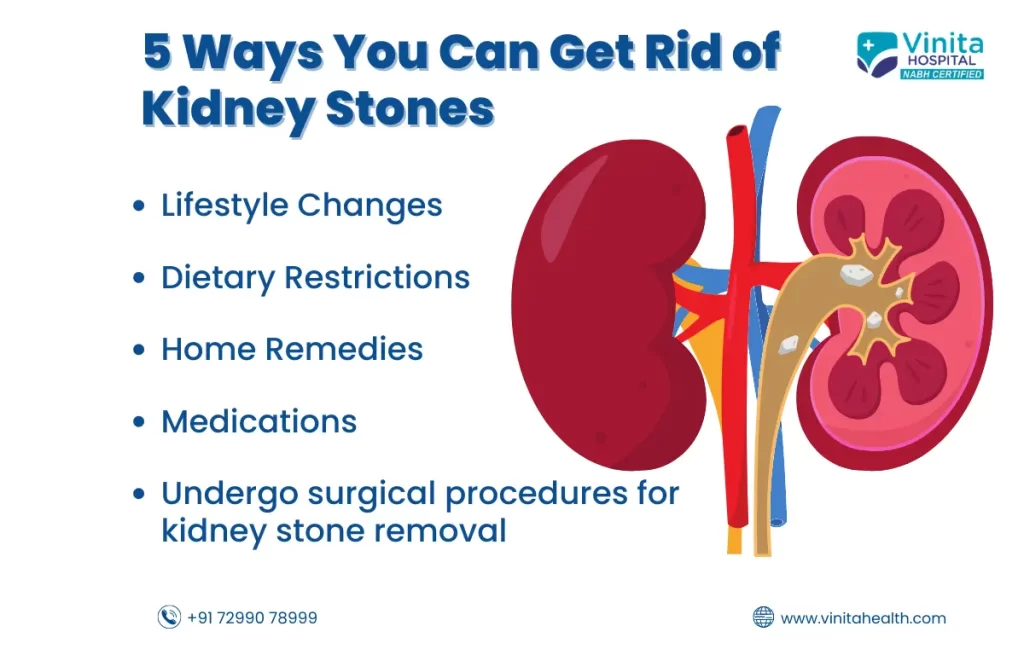If you’ve ever had a kidney stone, you understand the extent of their discomfort. They can induce significant discomfort and potentially result in more severe medical complications if not promptly addressed. So, if you’re wondering how to remove kidney stones, you’ve come to the right place.
In this blog post, we will explore diverse methods for eliminating kidney stones, ranging from natural remedies to medical interventions, enabling you to swiftly regain your optimal well-being.
Pain Relief
If you are suffering from the painful symptoms of kidney stones, there are several natural remedies that can help you to bring relief. The first step is to stay hydrated and drink plenty of fluids to help move the stones through your urinary tract. If the pain persists, over-the-counter medications such as ibuprofen and acetaminophen can help.
You can also try natural remedies such as:

- Magnesium citrate: Helps break down small stones.
- Lemon juice with warm water: The citric acid helps dissolve calcium-based stones.
- Apple cider vinegar with honey and water: Aids in detoxification and may ease passage.
- Hot or cold compress: Provides temporary relief from back or abdominal pain.
⚠️ If the pain is severe or persistent, consult your doctor immediately — it could indicate a blockage or infection that requires urgent care.

Passing the stone
Kidney stones can move naturally through the urine. However, some stones may be too big to excrete on their own. If this is the case for you, there are a few methods on how to remove kidney stones you can use to help aid in the process.
Drinking plenty of fluids is an essential part of passing the stone naturally. Increasing your water intake helps flush out the kidney stone and encourages its passage. Additionally, consuming lemonade, other citrus juices, or apple cider vinegar can help to break down the stone and encourage its passage.
Taking pain medication such as ibuprofen can help reduce the discomfort associated with passing a stone and make it easier for you to drink fluids. Additionally, herbs such as chanca piedra, uva ursi, and hydrangea root can be taken to increase the effectiveness of flushing the stone out.
In some cases, you may need to know how to remove kidney stones by using a procedure known as lithotripsy. During this procedure, ultrasound waves are used to break up the stone into smaller pieces that can then pass through the urine. Your doctor will be able to determine whether lithotripsy is right for you.
If you’d like to try passing the kidney stone without medical intervention, consider trying one of these methods on how to remove kidney stones naturally and then consult your doctor if needed. Understanding how to remove kidney stones naturally requires patience and persistence, but it can be done with the right combination of treatments.
Passing the Stone Naturally
Many small kidney stones pass naturally through urine. However, larger stones may require additional support. The key is hydration and patience.
Tips for Passing Stones:
- Drink at least 2–3 liters of water daily to flush out the urinary tract.
- Consume lemonade or citrus juices — their citric acid content can help dissolve stones.
- Use apple cider vinegar (1–2 tablespoons in a glass of water daily) to soften the stones.
- Take herbal aids like chanca piedra (“stone breaker”), uva ursi, and hydrangea root, known to support urinary health.
If pain is interfering with daily life, painkillers prescribed by your doctor can help.
In cases where stones don’t pass naturally, a non-invasive procedure called Shock Wave Lithotripsy may be recommended. This technique uses ultrasound waves to break stones into smaller pieces, making them easier to pass through urine.
💧 Natural removal takes time and consistency. Always consult your doctor before trying supplements or herbal remedies.
Surgery
Surgery is usually a last resort for those looking at how to remove kidney stones. Surgery is necessary when the stones are too large, or too numerous, to pass on their own. During surgery, an incision is made in the back, near the affected kidney. A scope is inserted into the kidney to locate and remove the stones. The complete procedure takes an hour.
Though it is an effective way to remove kidney stones, kidney stone surgery does come with risks, including infection and complications from anaesthesia. Additionally, after the procedure, you will need to take extra care to ensure that any new stones do not form.
If you’d like to avoid surgery altogether, there are other ways to think about how to remove kidney stones naturally. Drinking lots of fluids is essential for those with kidney stones. It helps to flush out small stones in the urinary tract. Eating healthy foods high in calcium can also help reduce your risk of developing kidney stones in the future. Natural home remedies such as basil tea and pomegranate juice have also been known to be effective in breaking down and passing kidney stones.
Which method is best how to remove kidney stones?
In searching for how to remove kidney stones so many methods can be the best for you, that is suggested by the doctor. The methods are
1. Shock Wave Lithotripsy.
2. Ureteroscopy.
3. Robot-assisted stone removal.
4. Percutaneous nephrolithotomy.
What are 3 treatments for kidney stones?
The three treatments are Pain relief, Passing the stone, and surgery even if you can try to adopt some natural ways to remove a kidney stone. If you are willing to know how to remove kidney stones naturally then some of the natural ways are consuming plenty of drinking water, eating fewer oxalate-rich foods, and continuing to eat calcium-rich foods.
How long can kidney stones last?
Most of the 60% of kidney stones that are 4–6 mm will go on their own within 45 days. Around 20% of kidney stones that are larger than 6 mm will move on for about 12 months. However, when stones are this large, they need surgical removal.
Preventing Future Kidney Stones Naturally
To reduce the risk of developing new stones:
- Drink plenty of water daily to dilute urine.
- Limit oxalate-rich foods (like spinach, beets, and nuts).
- Maintain a balanced intake of calcium — too little or too much can both contribute to stone formation.
- Reduce sodium and animal protein intake.
- Include natural beverages like basil tea and pomegranate juice, known for kidney-cleansing properties.
Conclusion
To conclude, this blog contains essential information about natural approaches to kidney stone removal, as well as insights into surgical procedures. Explore the comprehensive details to gain a thorough understanding and adopt the best methods to successfully eliminate kidney stones.
Read also Best Diabetologist in Chennai.





